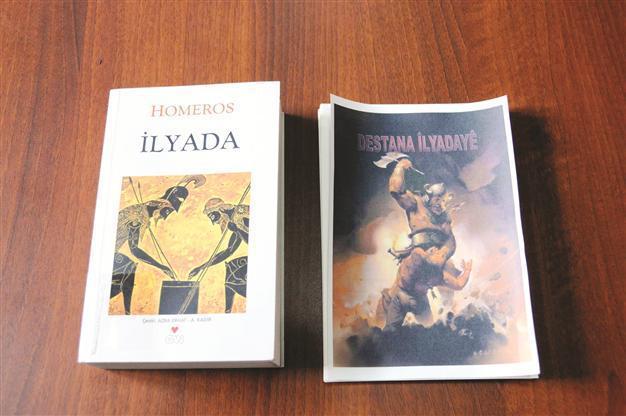Homer’s Iliad translated into Kurdish
ÇANAKKALE - Dogan News Agency

The five parts of Homer’s famous epic ‘Iliad’ will be published in a book both in Kurdish and Greek languages. The book will be released next mont.
The 2,800-year old “Iliad” epic of Homer is being translated into Kurdish in efforts that have been ongoing for three years by the Çanakkale Troy Foundation archaeologist Fecri Polat and Turkish teacher Kamuran Demir.The ancient Greek epic, which tells the story of the Troy War, is being translated in the northwestern province of Çanakkale, where the ancient city of Troy is located.
Polat, who works for the Troy Foundation as an archeologist and his Turkish teacher friend from İzmir, began working three years ago to publish the Ilıad epic in the Kurdish language. They have finished
the translation of the first four and the 24th part, which is the last part, of the epic. The five parts of the epic will be published in a book to be released next month.
The book “Destana İlyadaye” will be in Kurdish and Greek, the original language of the epic. The foreword written by German archaeologist on Iliad and Homer will be translated into Kurdish.
Speaking about the works, Polat said that the Ilıad epic was well known in the world and it had been translated into more than 30 languages so far.
“When starting the project, our friends working for the Kurdish Institute hesitated saying that Kurdish would be able to support the epic since it has a heavy lexicon. Most people said it was a dream but we worked without hesitation. Actually, the Iliad has many phrases that any language could not support in translation.
Dengbej tradition
“These phrases were written in dengbej (traditional Kurdish epic story) tradition. The language supported it word to word because both epics are the result of the same tradition. The Iliad was orally transferred during the dark period of 400 years when written language died out. The dengbej tradition was improved to prevent Kurdish language from dying out and people told their epics orally. This is why Kurdish became the best language supporting the Iliad epic,” Polat said.
He noted that it would take five years to complete the epic.
















